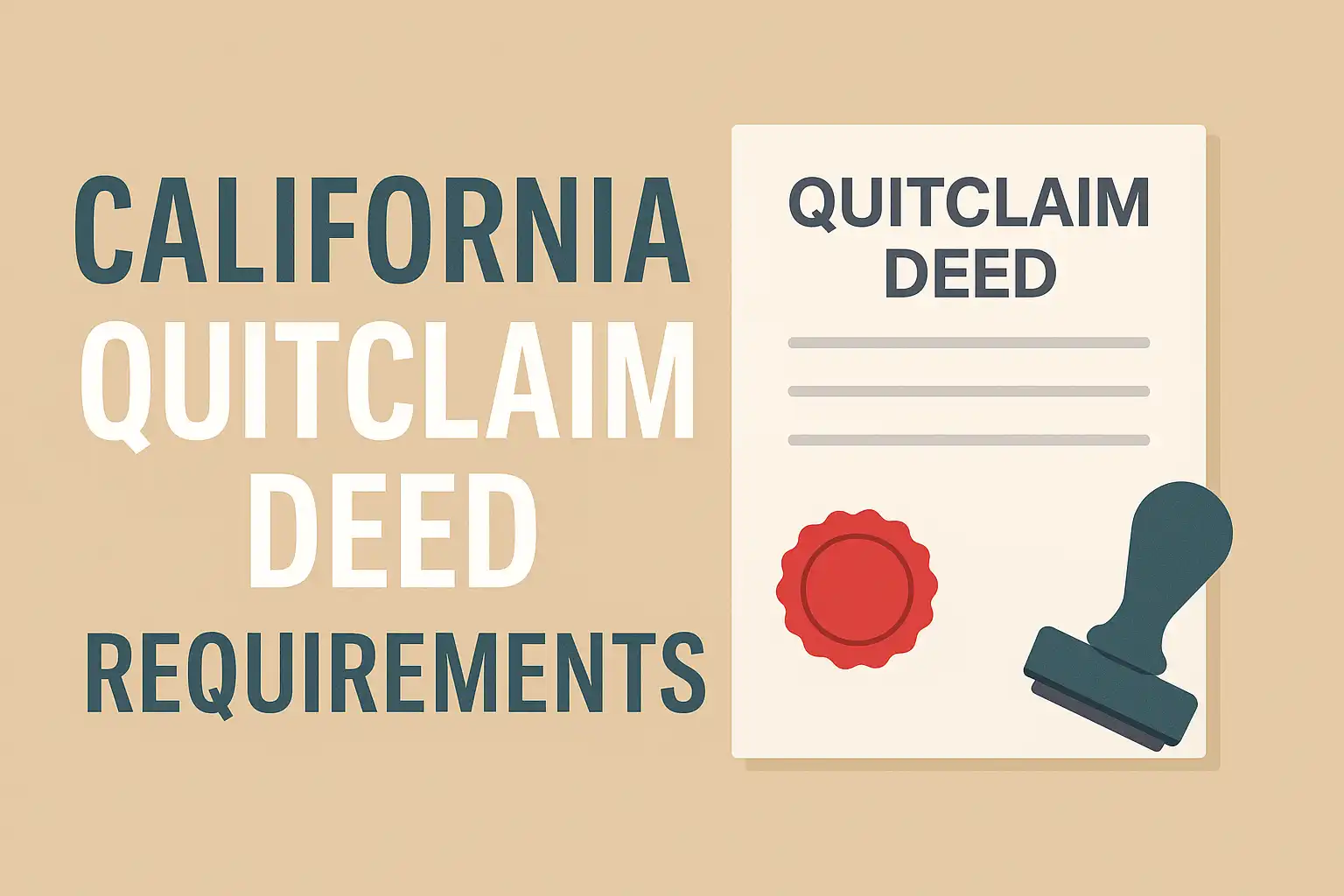
California Quitclaim Deed Requirements: Complete Guide 2025
California has specific legal requirements for quitclaim deeds that property owners must follow to ensure valid transfers. Understanding these state-specific rules can help you avoid costly mistakes and ensure your property transfer is legally binding and properly recorded.
As a real estate attorney practicing in California, I regularly help property owners navigate the state’s unique requirements for quitclaim deeds. This comprehensive guide covers everything you need to know about California quitclaim deed laws, procedures, and best practices.
California Quitclaim Deed Overview
California recognizes quitclaim deeds as valid instruments for transferring real property interests. Under California Civil Code Section 1092, quitclaim deeds transfer whatever interest the grantor may have in the property without warranties about the quality of that interest.
California uses the term “quitclaim deed” in its statutes, making it one of the states that officially recognizes this spelling rather than variations like “quit claim deed.”
Key California Characteristics
Community Property State: California is a community property state, which affects how married couples hold title and transfer property.
Documentary Transfer Tax: California imposes state transfer taxes, and many counties and cities add additional transfer taxes.
Proposition 13 Protections: California’s property tax system includes specific protections and transfer rules that may affect quitclaim deed transfers.
Disclosure Requirements: California has extensive property disclosure requirements that may apply even to quitclaim deed transfers.
Legal Requirements for Valid California Quitclaim Deeds
Essential Elements
Every valid California quitclaim deed must include:
Grantor and Grantee Information:
- Full legal names as they appear on current title documents
- Marital status of all parties
- Current mailing addresses
Property Description:
- Complete legal description from the current deed or assessor’s records
- Assessor’s Parcel Number (APN)
- Street address for identification purposes
Granting Language:
- Specific quitclaim language required by California law
- Proper consideration statement
- Date of transfer
Signatures and Acknowledgment:
- Notarized signature of the grantor(s)
- Proper notarial acknowledgment language
- Spouse signatures when required
California Civil Code Requirements
California Civil Code Section 1092 specifies the basic requirements for quitclaim deeds, while additional statutes address specific situations:
Section 1102 et seq.: Property disclosure requirements Section 1134: Recording and priority rules Family Code Sections 851-853: Community property transfer requirements
Property Description Requirements
California requires precise property descriptions that typically follow one of these formats:
Legal Description Types
Subdivision Properties: “Lot 15, Block 3, Maplewood Subdivision, as per map recorded in Book 45, Page 67, of Maps, Official Records of Los Angeles County, California.”
Metes and Bounds: “Beginning at a point on the westerly line of Main Street, distant 100 feet northerly from the intersection of the westerly line of Main Street with the northerly line of First Avenue; thence westerly parallel to said First Avenue 150 feet; thence northerly parallel to said Main Street 50 feet; thence easterly parallel to said First Avenue 150 feet to the westerly line of Main Street; thence southerly along said westerly line 50 feet to the point of beginning.”
Government Survey: “The Northeast Quarter of the Northwest Quarter of Section 15, Township 2 North, Range 3 West, San Bernardino Base and Meridian, in the County of Riverside, State of California.”
Assessor’s Parcel Number
California strongly recommends including the Assessor’s Parcel Number (APN) in all property descriptions. While not legally required, the APN helps ensure accurate identification and recording.
Signature and Notarization Requirements
Grantor Signature Requirements
Individual Grantors:
- Must sign their full legal name exactly as it appears on the current deed
- Signature must be notarized with proper acknowledgment
- Must provide valid government-issued photo identification to the notary
Corporate Grantors:
- Must be signed by authorized officers
- May require corporate resolutions authorizing the transfer
- Notarization requirements apply to individual signers
Spousal Signature Requirements
California’s community property laws create specific signature requirements:
Married Grantors:
- Both spouses must typically sign quitclaim deeds transferring community property
- Exception: Property held as separate property may not require spousal consent
- Consult with attorneys about specific title holding situations
Domestic Partners:
- California domestic partnership laws create similar requirements to marriage
- Both partners may need to sign depending on how title is held
Notarization Requirements
California requires notarized acknowledgments for all quitclaim deeds. The notary must:
Verify Identity:
- Require valid government-issued photo identification
- Ensure signers appear in person (remote notarization rules vary)
- Confirm signers understand the document’s nature
Proper Acknowledgment:
- Use California-approved acknowledgment language
- Include notary seal and signature
- Record notary commission expiration date
Common Notarization Issues:
- Expired notary commissions invalidate acknowledgments
- Improper identification can void the notarization
- Missing seals or signatures create recording problems
Recording Procedures in California
County Recorder Requirements
California quitclaim deeds must be recorded in the county where the property is located. Each county has specific requirements:
Document Format:
- Original documents only (certified copies may be acceptable in some counties)
- Proper margins and formatting requirements
- Legible text and signatures
Recording Fees:
- Base recording fees vary by county (typically $75-$100 for first page)
- Additional pages incur extra fees
- Special situations may require additional charges
Recording Timeline
Best Practices:
- Record quitclaim deeds within 30 days of execution
- Earlier recording establishes priority over later conflicting transfers
- Delays in recording can create title problems
Priority Rules:
- First recorded deed generally takes priority
- Actual notice can affect priority in some situations
- Race-notice recording statute applies in California
Documentary Transfer Tax
California imposes documentary transfer tax on most property transfers, including quitclaim deeds.
State Transfer Tax
Rate: $1.10 per $1,000 of consideration (or $0.55 per $500) Calculation: Based on the equity transferred, not the full property value Exemptions: Certain family transfers and specific situations may qualify for exemptions
Local Transfer Taxes
Many California counties and cities impose additional transfer taxes:
Los Angeles County: Additional $1.10 per $1,000 San Francisco: Additional $25.00 per $1,000 for properties over $25 million Other Jurisdictions: Rates vary significantly by location
Transfer Tax Considerations
Family Transfers: Some jurisdictions provide exemptions for transfers between spouses or family members Nominal Consideration: Even $1 transfers may trigger transfer taxes based on actual property value Gift Situations: Transfer taxes may apply even when no money changes hands
Proposition 13 and Property Tax Implications
California’s Proposition 13 creates specific rules about property tax reassessment that affect quitclaim deed transfers.
Reassessment Triggers
General Rule: Property transfers typically trigger reassessment to current fair market value Exceptions: Specific family transfers may qualify for reassessment exclusions
Parent-to-Child Exclusions
Proposition 58: Allows unlimited transfers of principal residences and up to $1 million in assessed value of other property between parents and children without reassessment Requirements: Proper claim forms must be filed with the county assessor Timing: Claims must be filed within specific deadlines to receive the exclusion
Grandparent-to-Grandchild Exclusions
Proposition 193: Provides similar exclusions for transfers between grandparents and grandchildren when parents are deceased Conditions: More restrictive than parent-child transfers Documentation: Additional documentation requirements apply
Between Spouses
Interspousal Transfers: Generally do not trigger reassessment when properly documented Divorce Situations: Transfers pursuant to divorce may qualify for continued Proposition 13 protection Documentation: Proper forms and timing requirements must be met
Community Property Considerations
California’s community property laws significantly affect quitclaim deed transfers.
Types of Property Ownership
Community Property: Property acquired during marriage with few exceptions Separate Property: Property owned before marriage or acquired by gift or inheritance Community Property with Right of Survivorship: Special form of community property ownership
Transfer Requirements
Both Spouses Required: Both spouses generally must sign to transfer community property Separate Property: Individual spouses can typically transfer their separate property without spousal consent Mixed Property: Properties with both community and separate property components require careful analysis
Title Holding Options
Joint Tenancy: Equal ownership with right of survivorship Tenancy in Common: Unequal ownership interests possible, no automatic survivorship Community Property: California’s default for married couples Trust Ownership: Property held in revocable or irrevocable trusts
Disclosure Requirements
California has extensive property disclosure requirements that may apply to quitclaim deed transfers.
Transfer Disclosure Statement (TDS)
Required for: Most residential property transfers of 1-4 units Exceptions: Some family transfers, court-ordered transfers, and specific situations Content: Detailed property condition information and known defects
Natural Hazard Disclosures
Required Disclosures:
- Earthquake fault zones
- Flood hazard areas
- Fire hazard severity zones
- Environmental hazard areas
Third-Party Reports: Professional disclosure companies typically prepare these reports Timing: Must be provided before transfer completion
Lead-Based Paint Disclosures
Federal Requirement: Properties built before 1978 require lead-based paint disclosures California Additions: State law adds additional requirements and penalties Documentation: Specific forms and pamphlets must be provided
Common Mistakes and How to Avoid Them
Property Description Errors
Problem: Incorrect or incomplete legal descriptions invalidate transfers Solution: Always copy legal descriptions exactly from current deeds or title reports Best Practice: Have descriptions verified by title companies when possible
Missing Spouse Signatures
Problem: Community property transfers without required spousal signatures are ineffective Solution: Understand title holding and community property rules before proceeding Best Practice: Consult with real estate attorneys about complex title situations
Improper Notarization
Problem: Invalid notarizations prevent recording and may invalidate transfers Solution: Use licensed California notaries who follow proper procedures Best Practice: Verify notary credentials and commission status before signing
Transfer Tax Miscalculations
Problem: Incorrect transfer tax calculations can delay recording Solution: Understand local transfer tax rates and calculation methods Best Practice: Consult with county recorders or tax professionals for complex situations
Missing Disclosure Forms
Problem: Failure to provide required disclosures can create legal liability Solution: Understand which disclosures apply to your specific transfer Best Practice: Work with real estate professionals familiar with California requirements
Special Situations in California
Transfers to Trusts
Revocable Trusts: Generally straightforward with proper documentation Irrevocable Trusts: May have additional tax and legal implications Requirements: Trust documents must be properly executed before property transfers
Divorce-Related Transfers
Court Orders: Transfers pursuant to divorce decrees have specific requirements Tax Implications: May qualify for special tax treatment Timing: Coordinate transfers with divorce proceedings and court orders
Estate Planning Transfers
Gift Tax Considerations: Federal and California gift tax rules may apply Medicaid Planning: Transfers may affect eligibility for government benefits Professional Guidance: Complex estate planning requires attorney consultation
Business Entity Transfers
Corporate Transfers: Additional documentation and authorization requirements Partnership Transfers: Partnership agreements may restrict or require specific procedures Tax Implications: Business property transfers often have significant tax consequences
Working with Professionals
When to Consult Real Estate Attorneys
Complex Title Issues: Multiple owners, unclear title history, or legal disputes High-Value Properties: Properties worth substantial amounts where mistakes are costly Business Transfers: Corporate or partnership property transfers Estate Planning: Complex family situations or tax planning needs
Title Company Services
Title Searches: Professional examination of property ownership history Title Insurance: Protection against title defects and unknown issues Escrow Services: Neutral third-party handling of transfer procedures Recording Services: Professional document preparation and recording
Tax Professional Consultation
Transfer Tax Planning: Understanding local transfer tax implications Property Tax Assessment: Navigating Proposition 13 and reassessment rules Gift and Estate Tax: Federal and state tax implications of transfers Business Tax Issues: Corporate and partnership transfer implications
Costs and Fees
Typical California Quitclaim Deed Costs
Attorney Preparation: $500-$1,500 for complex transfers Title Company Services: $300-$800 for simple transfers Recording Fees: $75-$150 depending on county and document complexity Transfer Taxes: Vary significantly by location and property value Notarization: $15-$50 per signature
Money-Saving Tips
Simple Family Transfers: May not require attorney preparation Online Resources: Some counties provide form templates Bulk Discounts: Multiple transfers may qualify for reduced fees Timing Considerations: Avoid rush charges by planning ahead
Step-by-Step California Quitclaim Deed Process
Phase 1: Preparation
- Determine ownership type and whether spousal signatures are required
- Obtain current legal description from existing deed or title report
- Calculate transfer taxes for your county and city
- Gather required disclosure forms if applicable
- Prepare quitclaim deed using proper California language
Phase 2: Execution
- Schedule notarization with licensed California notary
- Bring valid identification for all signers
- Sign deed in presence of notary public
- Obtain proper acknowledgment with notary seal
- Make copies for your records before recording
Phase 3: Recording
- Submit deed to appropriate county recorder’s office
- Pay recording fees and transfer taxes
- Provide required forms and supporting documentation
- Obtain recorded copy for your records
- File property tax forms if reassessment exclusions apply
Conclusion
California quitclaim deeds require careful attention to state-specific requirements, from community property rules to Proposition 13 implications. Understanding these requirements helps ensure your transfer is valid, properly recorded, and achieves your intended goals.
The complexity of California real estate law makes professional consultation valuable for many transfers, particularly those involving high-value properties, complex family situations, or business entities. Taking time to understand the requirements and work with qualified professionals can prevent costly mistakes and protect your property interests.
Remember that real estate transfers have lasting legal and financial consequences. When in doubt, investing in professional guidance typically provides valuable protection and peace of mind for your property transfer goals.
Sources:
- California Civil Code Section 1092
- California Revenue and Taxation Code Section 11911 et seq.
- California Board of Equalization Transfer Tax Guidelines
This guide provides general information about California quitclaim deed requirements and should not be considered legal advice. California real estate law is complex and frequently changes. Always consult with qualified California real estate attorneys for advice specific to your situation.


Leave a Reply